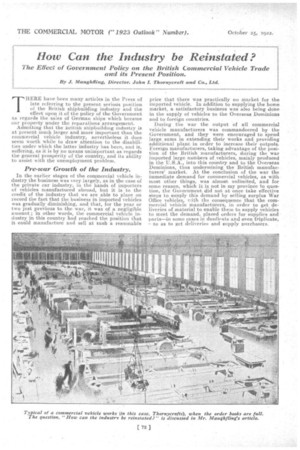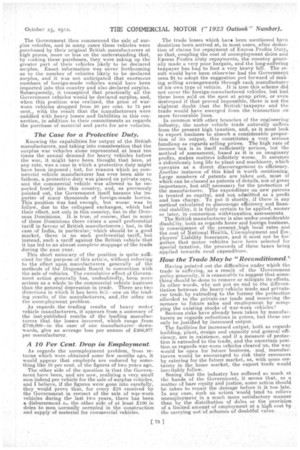How Can the Industry be Reinstated?
Page 2

Page 3

If you've noticed an error in this article please click here to report it so we can fix it.
The Effect of Government Policy on the British Commercial Vehicle Trade atrd its Present Position.
By J. Matighlling, Director. John I. Thornycroft and Co., Led.
THERE have-been many articles in the Press of late referring to the present serious position of the British shipbuilding industry and the effect upon it of the policy of the Government as regards the saes of German ships which became our property under the reparations arrangement.
.Admitting that the British shipbuilding Industry is at present much larger and more important than the commercial vehicle industry, nevertheless it does seem worth while to draw attention to the disabilities under which the latter industry has been, and is, suffering, as it is by no means unimportant as regards the general prosperity of the country, and its ability to assist with the unemployment problem.
Pre-war Growth of the Industry.
In the earlier stages of the commercial vehicle industry the business was very largely, as in the case of the private car industry, in the hands of importers of vehicles manufactured abroad, but it is to the credit of the industry that we are able to place on recard the fact that the business in imported vehicles was gradually diminishing, and that, for the year or two just previous to the war, it was of a negligible amount ; in other words, the commercial vehicle industry in this country had reached the position that it could manufacture and sell at snob a reasonable price that there was practically no market for the imported vehicle. In addition to supplying the home market, a satisfactory business was also being done in the supply of vehicles to the Overseas Dominions and to foreign countries.
During the war the output of all commercial vehicle manufacturers was commandeered by the Government, and they were encouraged to spend large sums in extending their works and providing additional plant in order to increase their outputs. Foreign manufacturers, taking advantage of the position of the British manufacturers, during the war imported large numbers of vehicles, mainly produced
in the into this country and to the Overseas Dominions, thus undermining the British manufacturers' market. At the conclusion of the war the immediate demand for commercial vehicles, as with most other things, was almost unlimited, and for some reason, which it is not in my province to question, the Government did not at once take effective steps to supply this demand by selling surplus War Office -vehicles, v:ith the consequence that the commercial vehicle manufacturers, in order to get deliveries of material to enable them to supply vehicles to meet the demand, placed orders for supplies and parts—in some cases in dunlirate and even riplicate, — so as to get deliveries and supply purchasers.
The Government then commenced the sale of surplusvehicles, and in many eases these vehicles were purchased by their original British manufacturers at high prices, more or less on the understanding that, by leaking these purchases, they were taking up the greater part of their vehicles likely to be declared surplus. Exact information was never forthcoming as to the number of vehicles likely to be declared surplus, and it was not anticipated that enormous numbers of foreign-made vehicles would have been imported into this country and also declared surplus. Subsequently, it transpired that practically all the Government vehicles would be declared surplus, and, when this position was realized, the price of warworn vehicles dropped from 50 per tent. to 75 per cent., with the result that the manufacturers were saddled with heavy losses and liabilities in this connection, in addition to their commitments as regards the purchase of material and parts for new vehicles.
The Case for a Protective Duty.
Knowing the capabilities for output of the British manufacturers, and taking into consideration that the surplus war vehicles alone represented at least ten times the annual demand for heavy vehicles before the war, it might have been thought that .here, at any rate, was a case in which a protective duty might have been imposed ; but, for reasons which no commercial vehicle manufacturer has ever been able to fathom, a protective duty was placed on private cars, and the commercial vehicle was allowed to be imported freely into this country, and, as previously pointed out, the Government itself became the importer of many thousands of foreign-made lorries. This position was bad enough, but worse was to follow, due to the collapsed exchanges, which had their effect, not only in this country, -but in the Overseas Dominions. It is true, of course, that in some of these Dominions there exists a small preferential tariff in favour of British manufacturers ; but, in the case of India, in particular, which should be a good market, there is no such preferential tariff, but instead, such a tariff against the British vehicle that it has led to an almost complete stoppage of the trade during the past year.
This short summary. of the position is quite sufficient for the purpose of this article, without referring to the effect upon manufacturers generally of the methods of the Disposals Board in connection with the sale of vehicles. The cumulative effect of Government action generally has, undoubtedly, been more serious as a whole to the commercial vehicle business than the general depression in trade. There are two directions in which it has been felt—one on the trading results of the manufacturers, and the other on the unemployment problem.
As regards the trading results of heavy motesvehicle manufacturers, it appears from a summary of the last-published results of the leading manufacturers that the losses incurred, which range from 2789,000—in the case of one manufacturer—downwards, give an average loss per annum of 2206,977 per manufacturer.
A 10 Per Cent. Drop in Employment.
As regards the unemployment problem, from returns which were obtained some few months ago, it would appear that employes are reduced by something like 10 per cent, of the figures of two years ago.
The other side of the question is that the Government have been, and are now, realizing a very small sum indeed per vehicle for the sale of surplus vehicles, and I believe, if the figures were gone into carefully, they would prove that, for every 210 received by the Government in resnect of the sale of war-worn vehicles during the last two years, there has been a disbursement o., the other side of at least 2100 in doles to men -aormally occupied in the construction and supply of material for commercial vehicles. • The trade losses which hay. been mentioned have doubtless been arrived at, in most cases' after deduction of claims for repayment of 'Excess Profits Duty, so that, Coupling the cost of unemployment doles and Excess Profits Duty repayments, the country generally made a very poor bargain, and the long-suffering taxpayer has had to foot a very heavy bill. The resuit would have been otherwise had the Government seen fit to adopt the suggestion put forward of making selling arrangements through each manufacturer of his own type of vehicle. It is true this scheme did not cover the foreign-manufactured vehicles_ but had these been sold on the spot at scrap price, or even. destroyed if that proved impossible, there is not the slightest doubt that the British taxpayer and the trade would have emerged from the transaction on more favourable lines.
In common with other branches ef the engineering industry, the motor vehicle trade naturally suffers from the present high taxation, and, as it must look to export business to absorb a considerable proportien ofits output, this constituteil a very serious handicap as regards selling prices. The high rate of income 'tax is in itself sufficiently serious, hut the method of assessment, based as it is on imaginary profits, makes matters infinitely worse. It assumes a ridiculously long life to plant and machinery, which operates as a direct discouragement to efficiency. Another instance of this kind is worth mentioning. Large numbers of patents are taken out, most of which Can be -classed as patents of details, not of great importance, but still necessary for the protection of the manufacturer. The expenditure on new patents is treated as capital, and not admitted as a profit and loss charge. To put it shortly, if there is any method calculated to discourage efficiency and financial stability, it is fairly certain to be applied, sooner or later, in connection withitaxation assessments. The British manufacturer is also under considerable disability, both as regards home and foreign business, in consequence of the present,high local rates and the cost of National Health, Unemployment and Enn. ployers' Liability Insurance, and it must not be forgotten that motor vehicles have been selected for special taxation, the proceeds of these taxes being applied towards road expenditure.
How the Trade May be "Reconditioned."
Having pointed out the difficulties under which the trade is suffering, as a result of the 'Government policy generally, it is reasonable to suggest that something should be-done to remove or mitigate its-effects. In other words, why not put an end to the differentiation between the heavy-vehicle trade and privateear trade, by extending to the former the protection afforded to the private-car trade and removing the menace to future sales and employment by scrapping the existing stocks of war-worn vehicles? Serious risks have already been taken by manufacturers as regards reductions in prices, but these can only be justified by increased output.
The facilities for increased output, both as regards building, plant, design and capacity and general efficiency, are in existence, and if a measure of protection is extended to the trade, and the uncertain position as regards war-worn vehicles cleared 11D, the way -would be open for future business, and, manufacturers would be encouraged to risk their resources by catering for the future market, as, with some certainty in the home market, the export trade would inevitably follow. . Seeing that the industry has suffered so much at the hands of the Government, it seems that, as a matter of bare equity and justice, some action should be taken to repair the damage before it i§ too. late, In any case, such an action would tend to relieve unemployment in a much more satisfactory manner than by the distribution of • doles or the provision of a limited amount of employment at a highi. cost by the carrying ourof schemes of doubtful value.






















































